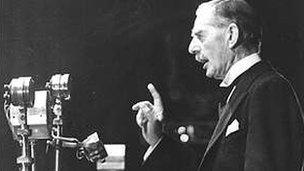Daily Politics Soapbox: George Trefgarne's 1930s lesson
- Published
Battersea Power Station was an icon from the 1930s that still dominates the London skyline in 2012
What can be learned from the depression of the 1930s compared with the economic problems facing the UK and other nations today? George Trefgarne from the Centre for Policy Studies finds there are lessons from history - in a personal viewpoint for the Daily Politics.
The difficulties of the eurozone have renewed questions in Britain and around the world as to whether "austerity" is really going to help return the economy to growth.
This debate is being played out within the coalition government too, with David Cameron coming under pressure from both left and right to do more to get the economy moving.
At times like these, history can be a useful guide and the prime minister could do worse than to consider the last time that Britain was caught up in a global financial crisis, when we actually led the world to recovery - the 1930s.
The consensus view of the 1930s as a universally destitute place is a myth.
While the mood was depressing in 1931, by the middle of the decade recovery had come and a British boom was underway.
How was this achieved, and what can we learn from the experience?
Back to life
Surprisingly, one lesson really does leap out. Austerity works, but only if accompanied by a devaluation of the currency, an effective cheap money policy based on low interest rates, and finally tax cuts.
In the 1930s, it was this medicine which brought the economy back to life.
By 1935, the economy was expanding at 7%. New industries, like car and aircraft production, manmade fibres and consumer goods took off.
Most strikingly, some 2.8m new homes were built, for this was the period when Britain became a home-owning democracy.
There was not only amazing technical innovation, it was a culturally buoyant time too, both in modern architecture and for reflective British artists like Ravillious, Bawden, Nicholson and Hepworth.

Neville Chamberlain may have been a more successful chancellor than prime minister
Here is another surprise. The architect of this strong recovery was a politician who has since become reviled for his role in appeasement of the Nazis, the then-chancellor, Neville Chamberlain.
He bestrode the era like a colossus and his successful political and economic strategy led to two of the biggest ever landslide election victories, in 1931 and 1935, when the Conservative-dominated National Government was returned with two massive majorities.
Whatever his subsequent failings as a prime minister, Chamberlain was for six years a great reforming chancellor, perhaps as great as Gladstone or Nigel Lawson.
He was also a skilful politician, who invented the Budget broadcast on radio and in the cinema, reduced the length of Budget speeches and even featured on the front page of Time magazine in America.
Five lessons can be drawn from the economic policies pursued first by Labour's Philip Snowden and later by Chamberlain:
Spending cuts work: tough spending cuts - including an immediate 10% cut in benefits and civil service salaries - quickly led to balanced budgets and maintained the confidence of citizens, businesses and international investors in Britain. Today's cuts are much shallower, one might even say timid, in comparison
Austerity in the public finances must be matched by a cheap money policy to encourage the private sector to expand: While this was achieved in the 1930s by restructuring the national debt, the effectiveness of today's quantitative easing policy is far less certain
Confidence in the legal and political foundations of the financial system must be restored: The early 1930s saw a number of high profile trials of those who had misbehaved in the previous decade. Today, nothing similar has happened and public confidence in the banks remains low
Tax cuts work: From 1934 onwards, Neville Chamberlain's income tax cuts for families and the low-paid gave a further boost to confidence. The top rate of tax was only 37.5%. A similar approach is needed today
The government must press on with welfare reform: The National Government failed to do enough for the long-term unemployed and for those areas which had been hit particularly hard by the recession. Today's coalition must not make the same mistake
Finally, while everyone has to make sacrifices, we should all do so confident in the knowledge that, in Chamberlain's phrase: "The quicker we can put down Bleak House, the sooner we can embark on Great Expectations."
Powerful inspiration
After a few years, Chamberlain felt able to reverse some of his cuts in spending.
The 1930s were not a perfect decade. Unemployment remained unacceptably high in the Special Areas which relied on shipbuilding and coal mining.
Nonetheless it is a period which offers powerful inspiration for our own troubled times.
<italic>Mr Trefgarne debated his ideas on Wednesday's Daily Politics with MPs Andy Burnham and Jeremy Browne.</italic>
- Published3 August 2011
- Published7 October 2011